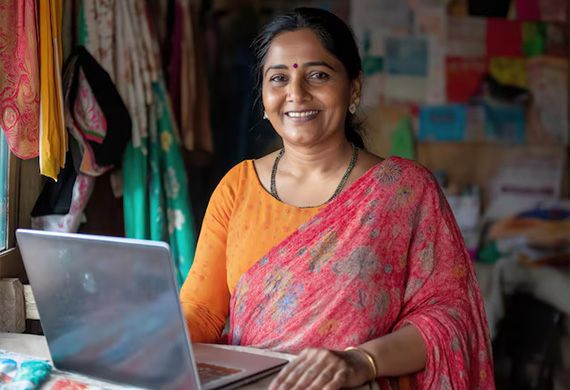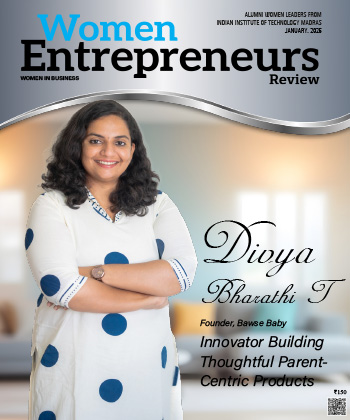
Women Founders Face Loan Barriers, Turn to Digital Solutions for Credit Access: GIM Research
By: WE staff | Monday, 18 August 2025
- Research carried out by the Goa Institute of Management shows women entrepreneurs face more challenges than men to obtain formal loans
- Women are encountering biases while accessing banks, government institutions, and other formal financial institutions
- These barriers curtail the possibilities of women achieving self-reliance and business growth
A recent study by the Goa Institute of Management (GIM) has found that women entrepreneurs have a harder time than men obtaining formal loans, which pointed to a long-standing gender gap in access to credit.
The problem, usually based on biases in banks, the government, and other institutions, is a major hurdle for women looking for self-sufficiency and business expansion.
The study, released in the journal Applied Economics, examined data of 4 lakh unorganised sector enterprises from the 2022-23 survey round of the National Sample Survey Office's (NSSO) Annual Survey of Unincorporated Sector Enterprises (ASUSE).
The study confirmed a distinct difference between men and women regarding access to formal credit.
Encouragingly, the survey also observed that women business owners that use digital financial technologies like internet banking and online financial services are more capable of overcoming these barriers, bridging the gender gap in access to credit.
Financial institutions have to become more proactive in encouraging entrepreneurship among women, according to Ashay Kadam (Banking, Insurance and Financial Services, GIM).
"Any discrimination based on caste or gender in the loans extended greatly restricts the amount of good that financial institutions can do with the credit they extend."
Dr. Swarna Parameswaran (Economics, General Management and Public Policy, GIM) also shared the same opinion and observed:
"Access to formal finance is critical for development and growth of women entrepreneurship in India. While women are disadvantaged relative to men, digital technology holds out hope of bridging the gap."
The experts emphasized the necessity of financial literacy, especially regarding online banking and financial instruments. Though fintech innovation has expanded at a brisk pace, awareness and adoption by women entrepreneurs in the unorganised segment have been behind.
Ashay further asserted that similar investment is required in knowledge sharing and financial literacy at the ground level to ensure women also derive the benefits from these technologies.
The study suggests:
- Reviewing banking and supervision policies for ending gender imbalance
- Facilitating greater usage of digital banking services in order to overcome information asymmetry and avoid repeated visits by clients to financial institutions
- Introducing special schemes and government-supported funds to promote digital adoption for women-led businesses in the unorganised segment
The reports affirm that although women still encounter systemic barriers to accessing credit, digital finance has the potential to be a strong leveler, unlocking entrepreneurship potential, and fueling inclusive economic development.
Most Viewed
- 1 Women's Health Startup HerMD Closing Doors Amid Industry Challenges
- 2 5 Famous Women in Indian Armed Forces
- 3 Saudi Women No longer Require Male Permission for Clothing Choices, says Prince MbS
- 4 Kolkata Medtech Startup Innovodigm Raises Rs 5.5 Crore Seed Funding Led by IAN Group
- 5 Yamunanagar's Kashish Kalra Honoured after Securing 111th Rank in UPSC Civil Services Exam
- 6 Madurai Appoints Its First Woman Corporation Head
- 7 IAS Vijayalakshmi Bidari Appointed as the new Nagpur Divisional Commissioner
- 8 American Entrepreneur Lucy Guo Overtakes T Swift to become Youngest Female Billionaire
- 9 ICC Women's World Cup 2025 Trophy Showcased at Indore's Holkar Stadium
- 10 Aparna Saxena's Beauty Venture AntiNorm Launches in India
- 11 Vidya Nataraj Co-Founded BlueStone Jewellery & Lifestyle files IPO
- 12 5 Women Freedom Fighters of India
- 13 Dr. G Krishnapriya appointed as CEO for Trichy
- 14 M3M & Sirona Partner to Introduce Menstrual Hygiene Vending Machines in 15 Locations
- 15 Punjab Govt launches SHE Cohort 3.0 Supporting Tech-led Women Startups
- 16 Indian origin Lawyer, Sweena Pannu appointed as the US New Superior Court Judge
- 17 The Aurora Tech Award recognizes 4 Indian Women-led Startups
- 18 Kerala's Republic Day parade featured an all-female tableau
- 19 Manisha Kabbur Becomes Karnataka's First Woman International Karate Coach
- 20 Director K. S. Ravikumar's Daughter Maalica Ravikumar Launches Life Coaching Company 'Evergrowth Academy' for Women
- 21 Leezu's Raises Pre-Seed Funding to Accelerate Growth in Sexual Wellness Industry
- 22 Sattu: Super-easy summer drink for PCOS gut healing
- 23 Swathi Nelabhatla creates Sitha App, India's First Women-Exclusive Gig Platform
- 24 7 Timeless Female Kathak Dancers & their Iconic Legacies
- 25 Meet 7 Iconic Women Architects of Modern India & their Most Impactful Work
- 26 This Woman-led Insuretech Startup is Helping Bridge the Education Financing Gap in India
- 27 Women Leaders Share Lessons Learnt from India Women's WC Win
- 28 5 Enterprising Women Founders Powering Singapore's Tech & Innovation Landscape
- 29 4 Women. 4 Stories. One Vision for Smarter, Stronger Healthcare
- 30 Global Gender Gap Narrows to 68.8%, But Full Equality 123 Years Away: WEF Report 2025
- 31 Changemakers: 7 Women Entrepreneurs Taking the Make in India Movement Forward
- 32 Meet Lucy Guo, The Youngest Self-Made Female Billionaire Disrupting Tech
- 33 How Women are Driving India's Festive Online Shopping Surge






